Reflecting as we go – Lessons from designing and delivering CDKN’s knowledge brokering workshops
Reflecting as we go – Lessons from designing and delivering CDKN’s knowledge brokering workshops
CDKN Learning Lead, Lucia Scodanibbio, reflects on what she’s discovered so far from developing and facilitating the first knowledge brokering workshops of the third phase of CDKN. She explains how CDKN’s approach has shifted from sharing knowledge brokering content to facilitating interactive and dynamic conversations that foster peer learning and cater to different learning styles, including those with an emphasis on play and experiential learning.
During the previous phase of CDKN, our learning revolved around the challenges, lessons and successes that CDKN and its partners encountered in facilitating evidence-based decision-making to accelerate climate action. Specifically, it focused on different tools and approaches for enhancing the use of knowledge in decision-making, and on the strategies used to translate this into policy and implementation.
The learning and experiences from our partners working in diverse contexts across three continents from a local to a global level were so rich that we felt compelled to think about how to disseminate these strategies and approaches more widely. In addition, we knew that the education system in the climate field, while strong on the theory, often overlooks many of the critical skills needed by knowledge brokers who are engaged in dealing with complexity and with the multiple stakeholders involved in climate decision-making and action.
Thus, developing a programme to strengthen the capacities of knowledge brokers became one of my core responsibilities for the new phase of CDKN that began in 2022.
Fast forward to the end of May 2024, and more than 60 participants from Africa, Latin America and Asia had participated in two knowledge brokering learning workshops. The closing evaluations from both showed a unanimous positive response: 100% of participants said their capacities to pursue knowledge brokering work had been strengthened and they had found all sessions to be useful.
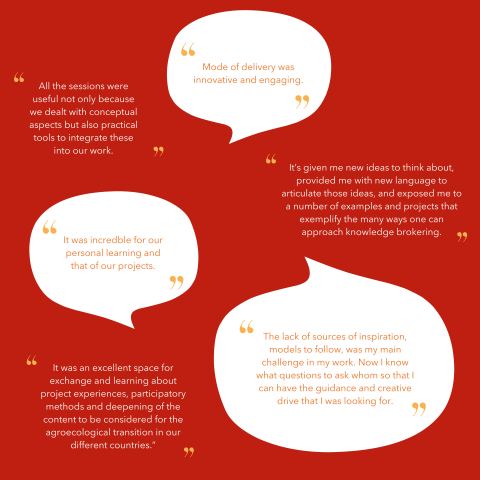
How did we get there and what did we do?
From a focus on delivering content to tailor-designed peer learning
When we started developing the knowledge brokering capacity strengthening programme, most of our efforts went into collating CDKN’s collective knowledge and experiences, as well as gathering cutting edge thinking, methodologies and approaches from leaders in topics as varied as systems thinking, co-creation, innovative and strategic communications, behavioural theory and the list goes on. As I searched and added to the growing curriculum, not only did I feel in a bottomless pit with no end – given the breadth and never-ending areas of expertise needed for ‘successful’ knowledge brokering – I also wondered about anyone’s capacity to absorb, never mind learn to master, this amount of content!
This came with the concurrent realisation that our workshop participants would not be empty vessels. On the contrary, many of them would be far more knowledgeable and experienced than us on a number of the concepts that we felt needed to be included in a knowledge brokering workshop.
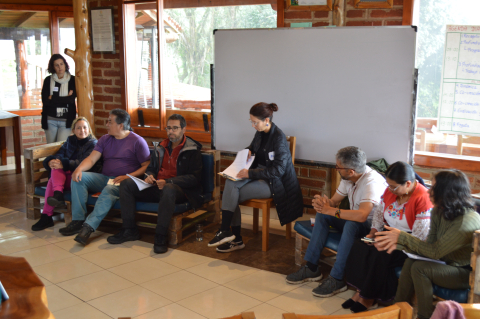
This realisation was confirmed in the results of a survey that the Climate Adaptation and Resilience (CLARE) programme’s principal investigators responded to, to share their expectations, needs and possible contributions to a knowledge brokering workshop planned for mid-2024. The survey clearly indicated that projects had a strong interest in learning from each other’s experiences and wanted a dynamic, interactive way to do this. In early 2024, we held individual calls with each participant to explain CDKN’s understanding of knowledge brokering and our suggested plans for a three-day workshop. The calls also gathered further feedback about what specific areas participants were interested in as well as where they could contribute. The actual types of contributions were shaped in these calls, as we discussed:
- Areas of existing content knowledge participants could share, such as specific tools (e.g. stakeholder mapping or political-economy analysis), including lessons that resulted from applying these tools in their own context.
- Experiences participants could present as a testimonial, as part of a talk-show format or using techniques like a fish-bowl conversation. These could, for example, include participants’ strategies to obtain government buy-in or to ensure stakeholders tangibly benefit from their work, or how they sought to grasp windows of opportunity.
- Questions participants had been grappling with in their work that could act as a provocation for others to delve into similar questions through different types of small group discussions (e.g. a World Café) or clinics to gather helpful input.
These conversations were crucial to developing the agenda in a bottom-up way, as potential ideas were surfaced and brainstormed together, yet leaving the conversation partly open as we wanted to ensure that the different pieces of the puzzle could come together as a coherent ‘whole’. Ultimately, it meant that participants themselves delivered significant components of the content, responding to the request for peer learning and ensuring that those giving input were indeed the experts on those topics rather than intermediaries like us.
From unidirectional delivery to interactive conversations and play
Since we started designing the knowledge brokering capacity strengthening programme, one of our main intentions was not only to cater for different learning styles, but also to ensure that as much, if not more, emphasis would be placed on experiential learning and dynamic group activities as on formally-delivered content and theory. Acknowledging Honey and Mumford’s perspective that there are four types of learners (theorists, pragmatists, reflectors and activists) and our own experience of fatigue (read often boredom) at the way many meetings and workshops are still run, we challenged ourselves to include a range of activities that would engage participants in diverse ways.
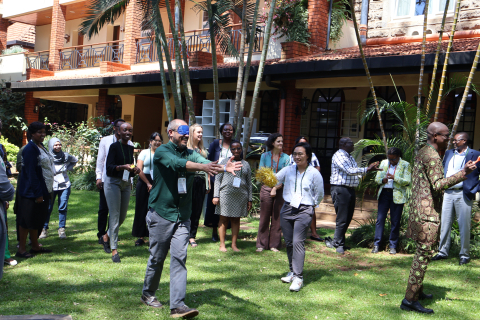
This is especially crucial in knowledge brokering, where our learning has shown that we need to shift toward “A more multifaceted appreciation of climate change in which relationships, power dynamics, trust and conflict management are as important as access to accurate information in moving towards climate resilience”. We have seen that what is needed in this space is not more theories about conflict management or power hierarchies, but rather tools and (very often simple) approaches to help surface the issues and enable reflective conversations around these (as all stakeholders have experienced them), as well as a focus on ‘how to’ go about addressing them.
With some targeted advice from our partners at the Red Cross Red Crescent Climate Centre, who are experts in the fields of experiential learning, games and interaction, we sought to design our agenda with the idea of creating a good flow and sequencing of diverse activities between the different sections of the workshops.
In practice, this meant that for the workshop we delivered with the CLARE research-for-impact hub each of the six modules we covered included an input of content (through presentations of 20 minutes or less), complemented by different interactive or experiential learning activities. At our Latin America workshop, where the initiatives focused on food systems transformation, we designed an agenda with minimal external content input. Instead, the workshop revolved around a variety of facilitated conversations that would surface participants’ knowledge and experience on different aspects of influencing policy and practice at multiple governance levels.
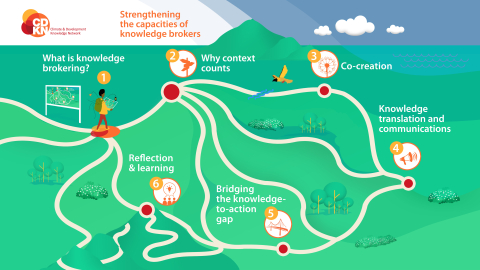
These diverse activities could take the form of:
- A game: for example, we used the ‘All hands on deck’ cards at the start of both workshops to establish a participant-led, common starting point regarding the elements needed for successful research-for-impact and influencing activities.
- A roleplay: we used the ‘Organizational Zoo’ cards during the session on co-creation as a reminder that participants of co-production (or any) workshops act in accordance with their values, beliefs, assumptions and/or personality traits. Knowledge brokers may want to use processes (such as roleplaying or a more formal research tool such as the Toolbox dialogue approach) to create awareness about or possibly even surface such differences, and make them visible to everyone. Once they are out in the open, it is easier to explore ways for the differences to be navigated in productive rather than conflictive ways.
- An experiential interlude: the Red Cross Red Crescent Climate Centre has developed several activities and games that help participants experience an issue related to the content of a particular segment of the workshop. They suggest these activities are an excuse for a brief reflection process that asks participants about the experience itself (‘what’), followed by how this relates to their work or the content at hand (‘so what’), and therefore opens the door for thinking about possible follow-up actions (‘now what’). For example, the farming juggle was used in both our workshops as a prelude to the last afternoon’s activity where the focus was to reflect on all the learning from the workshop and discuss the next steps. This small juggling game provided a tangible experience of overwhelm as participants grappled to keep multiple balls (representing different priorities) in the air, and it therefore opened the door to discussing strategies for prioritisation and realistic next steps.
- Tools to ensure everyone’s voice is heard: we used a simplified version of the ‘Time to think’ technique to give the opportunity to less outspoken participants to engage in a safe and trusted way. This was done by firstly sharing their ideas in timed, paired conversations guided by the principles of equality and being listened to with attention, interest, respect and no interruptions. Paired chats were followed by a plenary circle in which everyone had the same amount of time (30’’ or 1’) to share their ‘freshest thought’ with the group. Not only does this technique generate vast amounts of information (as everyone’s thoughts are heard as opposed to only those of the most dominant voices) but it also democratises the conversation and brings a diversity of approaches to a meeting. The principles of this technique were also applied in a clinic setting in our Nairobi workshop where participants held a small group conversation to share experiences that could trigger new ideas to help a ‘patient’ that had shared a particular challenge they were facing. Again, the fact that everyone contributed an experience meant an unusual wealth of ideas was generated in a very short period of time.
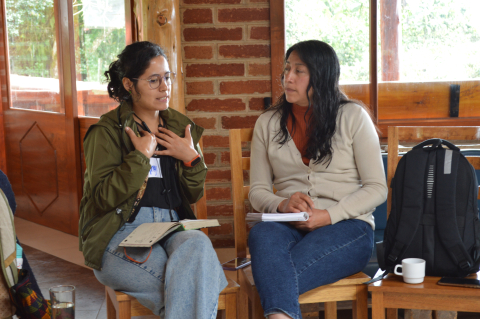
- Talk shows: these can be choreographed to higher or lesser degrees (e.g. by changing the layout of the room or direction everyone faces, having talk show guests sit on comfortable armchairs to change the ambience, having the talk show host impersonate a television speaker or create a show-like context for the audience). Ultimately, it is about giving a few participants (or external speakers) a chance to share their experiences in an informal setting, through timed, ideally brief interventions and having an interactive conversation, including answering questions from the audience. Our Latin America workshop combined a talk show, in which six participants shared their strategies to influence sub-national level actors on agroecology issues, with follow-up ‘Time to think’ paired chats and a plenary circle, in which everyone shared their top strategy to have impact at the sub-national level. Again, a great variety of suggestions was generated in less than 30 minutes.
Where next?
Thus far, we have been satisfied by the success of these first two knowledge brokering workshops. Our work is far from done, however. Here are some lessons learned, which point us towards some important next steps to further advance this work:
- Participants are thirsty for dynamic and interactive activities that give an opportunity to learn from others while having some fun in the process. We are eager to keep exploring new techniques and tools that can be used in our workshops to expand our curriculum as well as learning how to ensure there is a smooth flow between content, interaction, individual time, plenaries and group work. Several participants pointed at the level of intensity of our workshops, given there were few opportunities to sit back and listen passively, so we also have to be wary of not exhausting our attendees with too much activity!
- Facilitation skills are not to be taken for granted, particularly when including more complex experiential activities that are intended to create ‘aha moments’. While our Red Cross Climate Centre colleagues make facilitating games and reflection processes look easy, there is both an art and a science behind them which we need to continue becoming more adept at. A badly facilitated activity can leave participants confused and resistant to more experimental approaches in meetings. Having seen the power of these dynamic and interactive techniques, we are eager to continue strengthening our skills in developing and running workshops using these in future.
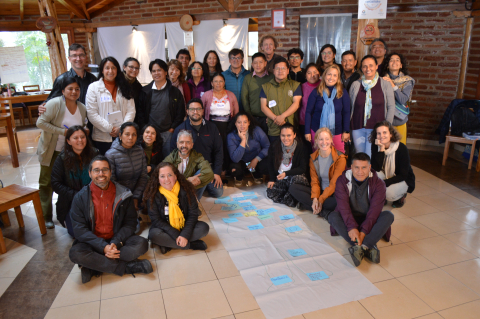
- CDKN is not the only actor strengthening skills in knowledge brokering and others are likely to be better equipped to transmit some of this complex content (e.g. systems thinking, motivations and behaviours, barriers to action). Our niche is shifting towards facilitating participatory, engaging and dynamic learning spaces where everyone can play a role in sharing expertise and knowledge and where we ensure we are using a variety of tools that help to capture and systematise the emerging lessons. This is important, given that many workshop attendees are no longer looking for vast amounts of content, which can easily be accessed through multiple online platforms and courses. They are rather seeking answers to ‘how’ to overcome challenges in their daily knowledge-to-action work and to learn this with and through the experience of others in similar situations to theirs. The positive feedback received so far encourages us to keep going in this direction.
Finally, on a personal note, I look forward to continuing to learn from others and furthering my own abilities to plan, design and run dynamic and interactive workshops. Juggling between holding the space, reading the room and the participants, capturing all the fascinating content that is emerging from everyone’s vast experience and knowledge (even if just in my own head), ensuring we are not running over time, and delivering content and experiences is most definitely not easy! We have been lucky to deliver the first two knowledge brokering workshops alongside many competent colleagues with whom we shared these responsibilities, yet I look forward to some of these tasks hopefully becoming second nature to me, if that is even possible…
We look forward to sharing more lessons as we progress along this learning path!
